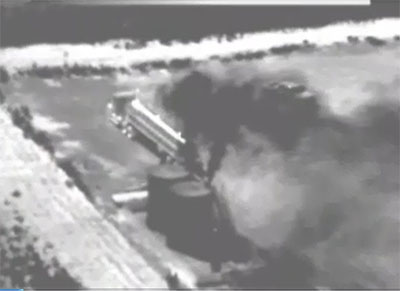Fracking, methane and climate

VOCs, including methane, emitting from a Texas oil and gas facility, revealed by a TCEQ infrared camera
Resource extraction has climate impacts.
Not just burning a resource, like coal or natural gas, but getting it out of the ground and taking it to market is bad for the climate.
It has long been assumed that natural gas, because it burns more cleanly than coal, is more climate friendly than coal. But emerging science strongly suggests that is not the case.
How can natural gas be worse for the climate than coal?
Carbon dioxide is formed when either coal or natural gas are burned. But natural gas is methane, and methane is much worse for the climate than carbon dioxide: 86 times worse over 20 years according to the Intergovernmental Panel on Climate Change (IPCC).
So if enough methane leaks before burning, its climate benefit relative to coal is erased.
Natural gas leaks when:
- a well is drilled
- a well is fracked
- the extracted gas is compressed into pipelines,
- it is transported by pipeline, and
- after wells are plugged or abandoned.
The cumulative effect of these leaks makes natural gas more climate-unfriendly than coal. Every independent study of gas-field methane emissions has corroborated this fact, including those from the National Oceanic and Atmospheric Administration (NOAA), Purdue University, and the Cornell University research team which was the first to explore the climate impacts of natural gas and shale gas production.
Solutions
By drawing attention to this issue, Earthworks and allies have helped push the Obama administration into a methane emission reduction plan.
It remains to be seen whether or not this initiative will result in meaningful change.
Our hopes are not high because the Obama administration is a fracking cheerleader, as are the Environmental Protection Agency and the Department of Energy --which together are responsible for developing the Administration's methane reduction strategy. Perhaps as a result, EPA severely undercounts methane's greenhouse gas power (relative to the global experts at the IPCC), and it has largely ignored the sea change in the science of methane pollution over the past two years.
Furthermore, even if strong regulations are enacted, there is no credible expectation that they will be enforced. Due to budget cuts, EPA has been significantly cut its enforcement efforts -- and the results are already harming communities dealing with oil and gas development.
Ultimately, the best solution to dealing with methane leaks from natural gas extraction is to not extract it at all
Follow Earthworks